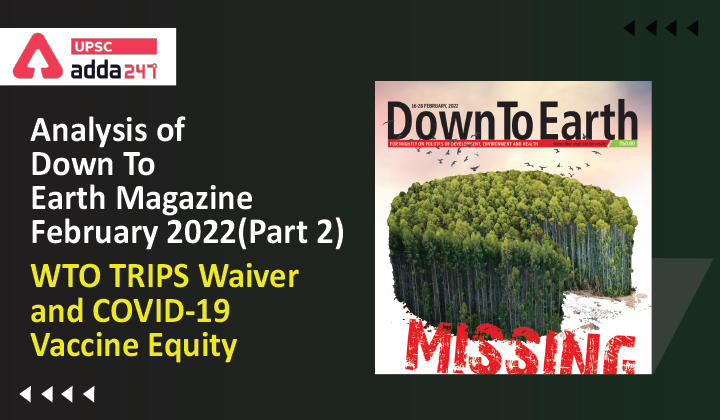Table of Contents
Analysis of Down To Earth Magazine:
WTO TRIPS Waiver and COVID-19 Vaccine Equity
Relevance
”GS 3: Health, Intellectual Property Rights (IPRs)”
Introduction
- In October 2020, India and South Africa had submitted a proposal to the World Trade Organization (WTO), suggesting a waiver of certain provisions of the Trade-Related Aspects of Intellectual Property Rights (TRIPS) Agreement for the “prevention, containment and treatment of COVID-19”.
- The proposal seeks the waiver of “the implementation, application, and enforcement of sections 1, 4, 5 and 7 of part II of the TRIPS agreement”, which are stipulations referring to copyright, industrial design, patents, and undisclosed information (trade secrets).
- The proponents of the proposal argue that a waiver will enable timely and equitable access to affordable health products and technologies, including vaccines.
About TRIPS and exceptions
- TRIPS, a comprehensive multilateral agreement on Intellectual Property (IP), was an outcome of the Uruguay Round (1986–94) of negotiations of the General Agreement on Tariffs and Trade (GATT).
- The Agreement came into force on 1 January 1995 and offers a minimum standard of protection for Intellectual Property Rights (IPR).
- In WTO, IPR are divided into two main categories. First, copyright and related rights (Articles 9 to 14, Part II of the TRIPS Agreement).
- Second, industrial property that includes trademarks, geographical indications, industrial designs, patents, integrated circuit layout designs, and undisclosed information (Articles 15 to 38, Part II of the TRIPS Agreement).
- Article IX.3 and IX.4 of the Marrakesh Agreement establishing the WTO deals with TRIPS waivers. Article IX.3 says that in “exceptional circumstances” the Ministerial Conference may waive off an obligation imposed on WTO member countries.
- Such a decision requires the support of three-fourths of the WTO membership.
- According to Article IX.4, any waiver granted for more than one year will be reviewed by the Ministerial Conference.
- The TRIPS Agreement provides some flexibility primarily in the form of compulsory licensing and research exceptions through Articles 30 and 31.
- While Article 30 permits WTO members to make limited exceptions to patent rights, Article 31 provides a detailed exception, provided certain conditions are met.
- Compulsory licensing is the process of granting a license by a government to use a patent without the patent holder’s consent.
- Article 31 permits granting a compulsory license under circumstances such as “national emergencies”, “other circumstances of extreme urgency”, “public non-commercial use”, or against “anti-competitive” practices.
- In addition to these original waivers, the Declaration on the TRIPS Agreement and Public Health, adopted at the 2001 Doha Ministerial Meeting, also recognises some exceptions, for instance, in situations of a public health emergency, member countries have the freedom to determine the grounds upon which compulsory licenses are granted.
- Similarly, under Article 66.1, the least developed countries (LDCs) are given waivers for implementing TRIPS on pharmaceuticals till 1 January 2033.
COVID-19 and Need of a TRIPS Waiver
- Two significant factors rekindled the debate on TRIPS waiver for essential medical products—first, vaccine inequity, and second, the insufficiency of existing waiver provisions in fighting the COVID-19 pandemic.
- COVID-19 is an exceptional circumstance, and equitable global access to the vaccine is necessary to bring the pandemic under control. However, the world is witnessing quite the reverse, i.e., vaccine nationalism.
- Vaccine nationalism is “my nation first” approach to securing and stockpiling vaccines before making them available in other countries.
- A TRIPS waiver would be instrumental in addressing the growing inequality in the production, distribution, and pricing of the COVID-19 vaccines.
How Vaccine Inequity can weaken the fight against Covid-19?
- Vaccine inequity is not only morally indefensible but also clinically counter-productive.
- Allowing most of the world’s population to go unvaccinated will also spawn new virus mutations, more contagious viruses leading to a steep rise in COVID-19 cases.
- Such a scenario could cause twice as many deaths as against distributing them globally, on a priority basis.
- Preventing this humanitarian catastrophe requires removing all barriers to the production and distribution of vaccines. TRIPS is one such barrier that prevents vaccine production in LMICs and hence its equitable distribution.
Argument Against the Proposed TRIPS Waiver
- The TRIPS Agreement includes several provisions which mandate the promotion of technology transfer from developed countries to LDCs.
- Another argument against the proposed TRIPS waiver is that a waiver would not increase the manufacturing of COVID-19 vaccines.
- Further, a TRIPS waiver will not automatically translate into improved manufacturing capacity.
- A mere patent waiver may not be enough to address the issues related to its production and distribution. What is more important here is to share the technical know-how and information such as trade secrets.
Conclusion
In short, the proposed waiver, if agreed, will help India in addressing the public health crisis by producing more vaccines and distributing them at home; economically, by boosting its generic pharmaceutical industry, and diplomatically, providing vaccines to the developing and least-developed countries. Therefore, India should use all available means and methods, from trade-offs to pressurising, to make the waiver happen.



 TSPSC Group 1 Question Paper 2024, Downl...
TSPSC Group 1 Question Paper 2024, Downl...
 TSPSC Group 1 Answer key 2024 Out, Downl...
TSPSC Group 1 Answer key 2024 Out, Downl...
 UPSC Prelims 2024 Question Paper, Downlo...
UPSC Prelims 2024 Question Paper, Downlo...




